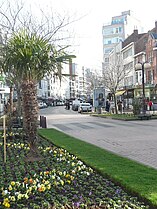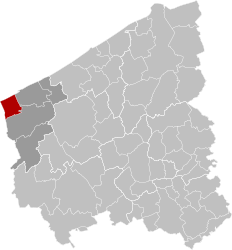De Panne
De Panne
La Panne (French) | |
|---|---|
 De Panne town centre view | |
| Coordinates: 51°06′N 02°35′E / 51.100°N 2.583°E | |
| Community | Flemish Community |
| Region | Flemish region |
| Province | West Flanders |
| Arrondissement | Veurne |
| Government | |
| • Mayor | Bram Degrieck (Het Plan - B) |
| • Governing party/ies | Het Plan -B, ACTIE, N-VA |
| Area | |
| • Total | 26.63 km2 (10.28 sq mi) |
| Population (2018-01-01)[1] | |
| • Total | 11,129 |
| • Density | 420/km2 (1,100/sq mi) |
| Postal codes | 8660 |
| NIS code | 38008 |
| Area codes | 058 |
| Website | www.depanne.be |
De Panne (Dutch pronunciation: [də ˈpɑnə] ; French: La Panne [la pan]) is a town and a municipality located on the North Sea coast of the Belgian province of West Flanders. There it borders France, making it the westernmost town in Belgium. It is one of the most popular resort town destinations within Belgium. The municipality includes the village of Adinkerke. On 1 January 2011, De Panne had a total population of 10,748 on a total area of 23.90 km2, which gives a population density of 449.7 inhabitants per km2.
Miscellaneous
[edit]This section needs additional citations for verification. (December 2023) |
Famous people who have lived or died in De Panne include King Albert I and Queen Elisabeth, and John Aidan Liddell, VC, who died in De Panne in August 1915. The Belgian royal family lived in De Panne during the First World War because it was located in the tiny fraction of their country that was not conquered by the Germans.
De Panne is home to Plopsaland, a theme park aimed at young children and located on the former grounds of Meli Park. De Panne was also the place where the first land yachts intended for sport were built and used by the Dumont brothers in 1898. On 17 July 1831, Leopold I, the first Belgian king, sailed to Calais from England, and arrived in Belgium in De Panne. The Leopold I Esplanade, which includes a statue of him, commemorates his arrival.
Since 1977, the town has hosted the Three Days of De Panne cycle race, which is held in the run up to, and traditionally used by riders as preparation for the Tour of Flanders.[2]
De Panne was the site of a Belgium-England undersea telephone line laid by Siemens before the war, and therefore was used as Gort's headquarters for the evacuation of nearby Dunkirk to allow contact with England.[3]
Transport
[edit]De Panne Railway Station is located in nearby Adinkerke. There are regular NMBS trains to Brussels. The line across the border to Dunkirk is out of use. DK Bus run buses from the station forecourt to Gare de Dunkerque.[4] A cross-border campaign group Trekhaak-73 is seeking to re-open the railway line.
Belgian Military Cemetery of De Panne
[edit]The cemetery is located at Kerkstraat 69 in De Panne, 1 km south of the church. Besides Belgian soldiers who died in the First World War there are also British soldiers who died in the Second World War. 3,744 soldiers have been buried here.[5] Nearby is Adinkerke Military Cemetery.
Images
[edit]-
Monument to King Leopold I
-
Beach and apartment buildings
References
[edit]- ^ "Wettelijke Bevolking per gemeente op 1 januari 2018". Statbel. Retrieved 9 March 2019.
- ^ Ryan, Barry (2 April 2014). "Three Days of De Panne fighting for its place in Classics calendar". cyclingnews.com. Retrieved 3 April 2014.
- ^ "George H.J. Hook & Herbert G. Hook and the 1926 cable sections". Retrieved 7 February 2024.
- ^ (in French) DK Bus website. Accessed 10 December 2023.
- ^ Description of the architecture and history of the Belgian military cemetery of De Panne, onroerenderfgoed.be. Accessed 10 December 2023. (in Dutch)]
External links
[edit]- Official website - Information available in Dutch and limited information available in French, English and German







